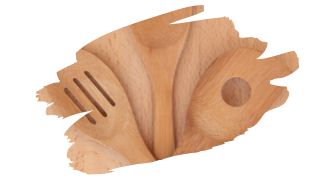Teak, Acacia, and even Sugar Maple. All of these hardwoods have one big thing in common…they all can make for amazing durable cooking utensils.
But what about Beech wood? How well does this timber hold up as cookware material?
Well, in this post, you’ll discover what type of wood makes for the most long lasting durable wooden spoons — and why. We also dive into Beech woods suitability as cookware.
And keep reading to learn which kind of non-toxic wood finish can best protect Beechwood cooking utensils.

This post may contain affiliate links to products that we receive a commission for (at no additional cost to you). Learn more here.
What Is The Best Kind Of Wood For Cooking Utensils?
The best cooking utensils are made from naturally water-resistant hardwoods. For example, Teak wood is a great choice for making long-lasting wooden spoons.
You see, Teak has a characteristic to it that makes it resistant to rot and decay…it’s own natural tree oils. It’s tree oil act’s like a wood finish, such as Linseed oil or Tung oil.
Basically, this natural tree oil saturates and coats the grain of Teak, preventing moisture from being absorbed into this wood. And this, in turn, stops wood rot in it’s tracks.
It’s natural water-resistance, (coupled with the hard density of this timber), makes Teak wood one of the most durable types of lumber in the world.
Related Post: Is Teak Wood A Good Choice For Cooking Utensils?
What About Beech Wood? Is It A Good Wood For Making Wooden Spoons?
Well, first things first, Beech wood is nowhere near as rot-resistant as Teak wood. In fact, this wood will fast deteriorate without some kind of water-repellent wood finish to safeguard it.
However, Beech wood is a very tough wood. European Beech wood, (the Beechwood species most popularly used to make cookware), is even harder and tougher than Teak. In fact, Beech wood is about as hard as White Oak.
Still, provided you properly seal your beechwood spoons, this wood can also make for a great choice timber.
There is one major caveat to this though — don’t leave Beech wood spoons soaking in cooking pots. Why? Because a wood finish can only do so much to protect this lumber. So, you should do what you can to prevent your Beechwood cookware from soaking in water for too long.
This also means dishwashing Beechwood cooking utensils is pretty much out — stick to hand washing only.
Related Post: Is Beech Wood Good For Wood Carving?
OK…But Is Beechwood Safe Near Food?
Beech wood, in it’s solid form, is a food safe surface. So, yes, Beech wood is safe to use in the kitchen.
The only time Beech wood poses a risk to human health, is if it’s sawdust.
Beech wood sawdust is a sensitizer. And this means that it can cause skin allergies — or severe respiratory problems if inhaled.
Great! What Kind Of Wood Finish Should You Use On Beech Wood Cookware?
The only kind of finish safe enough to use on cookware, (such as wooden spoons), is a food grade one.
You see, a food grade wood finish doesn’t pose a health risk if it comes into direct contact with food. Typically, these finishes are so refined and well-filtered, that they’re even safe enough for human consumption.
But, most food grade wood finishes aren’t permanent, (unlike say a polyurethane wood finish). So, food grade finishes need to be reapplied often — roughly every one to two months (depending on frequency of use).
Related Post: 4 Reasons Why You Should NOT Use Polyurethane On A Butcher Block
So, What Kinds Of Food Grade Wood Finishes Do You Recommend?
Two of the best food grade wood finishes are pure 100% food grade mineral oil, and pure fractionated coconut oil.
You can learn more about fractionated coconut oil by checking out our post here: What Will Fractionated Coconut Oil Do To Your Cutting Board?
And What’s Food Grade Mineral Oil Exactly?
Food grade mineral oil is pretty much the gold-standard finish for any wooden food-prepping surface.
Related Post: Can You Put Food Safe Epoxy Resin On Cutting Boards?
Mineral oil comes from petroleum distillate. However, unlike most other petroleum-based products, this particular oil has been thoroughly refined.
You can find food grade mineral oil, at most local pharmacies, being sold as a laxative. But, as a wood finish, this oil acts like a penetrating oil finish.
It will soak right down into Beech wood grain, preventing water from being absorbed into your cookware.
You can learn more about mineral oil by hopping on over to our post: Walrus Oil Vs Mineral Oil: Which One’s Better For Your Cutting Board?
To Wrap Up, Here Are The 3 Key Takeaways From This Post…
- 1). Beech wood is a tough hardwood. It’s hard density makes for long lasting cookware.
- 2). However, Beech wood is not rot-resistant. And without a water-repelling wood finish, it’ll fast succumb to rot and decay.
- 3). You should regularly saturate Beech wood cookware with a food grade wood finish like Mineral oil or Fractionated Coconut oil.

